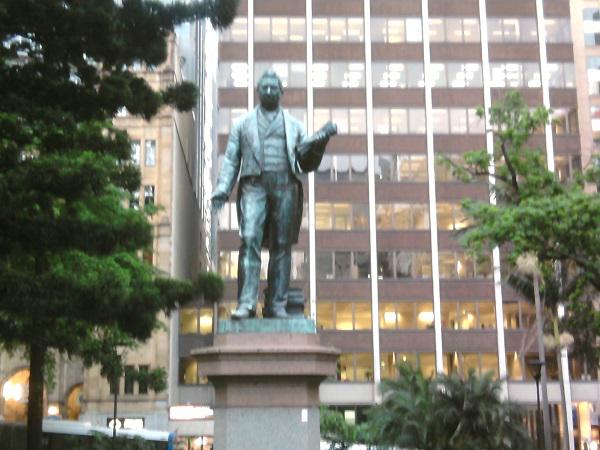St Bogan is the patron saint of scabbing off your neighbours and not returning items of garden equipment that you have borrowed throughout the year. If goods are not claimed before midnight on St Bogan's Day, the ownership legally reverts to the person who has borrowed them; which is both a source of annoyance for those poor souls who find that they no longer own some important stuff and a source of joy for those pilfering scabs who no longer feel bad about not returning anything.
Research shows that there were most probably bogans on the First Fleet. Obviously Captain Arthur Phillip was not a bogan because he was a toff but James Cook who had sailed a ship around the world and sticking a flag into any one bit of dirt that he liked, was certainly a forerunner to the modern bogan. Cook's descendants are probably modern day Chavs who live on British council estates and collect benefits. Cook who was a Yorkshireman probably uttered the first words that might be considered to be sort of English when in 1770 he uttered the immortal "This place ent like Yorkshire. It's well rubbish" before sticking the Union Jack in the ground, claiming the continent for Britain and then refusing to return it to its original inhabitants. Owing to the fact that native people didn't claim back their lands before St Bogan's Day, under the doctrine of Terra Nah-your-loss, those lands became the legal property of the British until the population of non bogan people in Australia overtook that of bogans.
It is not known exactly who St Bogan was, or even if there was a St Bogan. The original bogans were first identified in Melbourne's western suburbs like Spotswood and Tottenham but it was soon pretty clear that bogans existed in all mainland capital cities, many rural areas and had undergone damage due to mould whilst living in Tasmania.
Apart from Cook's initial act of boganism in 1770 and Phillip's second act of boganism in 1788 by rocking up and plonking a colony down in Sydney with no intent to return anything, the majority of the First Fleet had been transported to Australia for excessive boganimity or sheilaness. Most were sentenced to death but had this commuted to transportation and especially public transportation because as we all know from the extensive research by that well known historian Joseph Hockey, poor people don't own cars.
Much like the legend of Santa Claus, the origins of St Bogan are shrouded in mystery; with the most likely explanation being that after the first account was written, St Bogan borrowed the first copy and never returned it.
Most versions of the St Bogan story involve the tale of a man who had stolen one of the King's best oxen. St Bogan had some ploughing that he needed to do and borrowed the oxen. When the king sent around his sherrifs to recover the stolen oxen, they were not on the lands of this particular man but in St Bogan's barn and thus could not be found. The man escaped the penalty of death for poaching the king's oxen and he was eternally grateful. St Bogan did not return the oxen.
St Bogan was soon canonised as a saint after three miracles were attributed to him. He turned dirt into mud, he turned water into mud and he made a deaf man blind after a lengthy sermon on the subject of not returning a herd of sheep.
A statue stands above St Bogan's Railway Station in Sydney, where he can be seen holding a copy of the newspaper which he borrowed and has no intention of returning. A brass plaque used to be affixed to the front of the statue but that too has been borrowed with no intention of return.
- Statue of St Bogan above St Bogan's Railway Station
The traditional celebrations on St Bogan's Day involve sending one children round to your neighbours' houses and getting them to ask to borrow no end of useful and valuable items; safe in the knowledge that at the stroke of midnight, all of the stuff that has been borrowed does not have to be returned.
The traditional response to all of these children showing up at the door is to buy them off with cheap sweets because children neither show guile nor skill when it comes to the negotiation for items. Mostly, children who walk away from people's houses having failed to procure either sweets, biscuits, chocolate, garden furniture, power gardening tools, white goods or small computer equipment, will retaliate by throwing eggs at houses, slashing tyres and throwing excessive amounts of toilet paper over cars and roofs.
Okay. All of this is a lie and there is no St Bogan. However, this is still a culturally more accurate description of the 31st of August on Halloween, when parents send their children out to scab off of their neighbours. The whole iconography of pumpkins also makes no sense because in Australia, it is spring time and the evenings are getting lighter and longer; not darker and colder.
Yes, I am a curmudgeon whose hair has started to grey and whose days are probably fewer ahead than behind but someone more important needs those chocolates and sweets - me!
It would be really really weird if I came round to your house and demanded stuff on the 30th of October. Why is it acceptable for you to send your kids round to mine a day later and do likewise?
I still want to borrow your hedge trimmer forever; with no intent of returning it though. It's the right thing to do on St Bogan's Day.


No comments:
Post a Comment